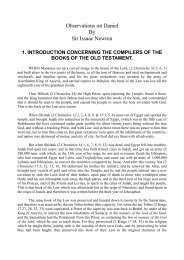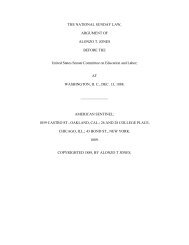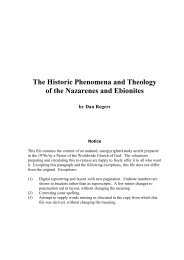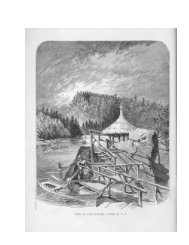THE EARLY CHRISTIAN SABBATH - Friends of the Sabbath Australia
THE EARLY CHRISTIAN SABBATH - Friends of the Sabbath Australia
THE EARLY CHRISTIAN SABBATH - Friends of the Sabbath Australia
You also want an ePaper? Increase the reach of your titles
YUMPU automatically turns print PDFs into web optimized ePapers that Google loves.
1. Jesus and <strong>the</strong> <strong>Sabbath</strong><br />
The Early Christian <strong>Sabbath</strong><br />
JESUS “broke <strong>the</strong> <strong>Sabbath</strong>!” John5:18. Of this fact <strong>the</strong>re are numerous instances.<br />
The Jewish leaders challenged <strong>the</strong> disciples, who, against <strong>the</strong> “traditions <strong>of</strong> <strong>the</strong> elders,”<br />
ga<strong>the</strong>red and ate handfuls <strong>of</strong> grain on <strong>the</strong> <strong>Sabbath</strong> day. Jesus refused to rebuke His<br />
followers for this. Mat<strong>the</strong>w 12:1-8. The Jews had a tradition that on <strong>the</strong>ir <strong>Sabbath</strong> day no<br />
sick might receive treatment. Again and again Jesus healed people on <strong>the</strong> seventh-day<br />
<strong>Sabbath</strong>, sometimes in <strong>the</strong> synagogues, sometimes in homes or at roadsides. It was on <strong>the</strong><br />
<strong>Sabbath</strong> day that Jesus healed a paralytic, hopeless after years <strong>of</strong> suffering. It was on <strong>the</strong><br />
<strong>Sabbath</strong> day that Jesus healed a man horn blind. Nei<strong>the</strong>r <strong>of</strong> <strong>the</strong>se men would have<br />
suffered augmented hurt had <strong>the</strong>ir healing been postponed one more day, but Jesus did<br />
not wait. He deliberately broke <strong>the</strong> Jewish <strong>Sabbath</strong>. And what He did made <strong>the</strong> Jewish<br />
traditionalists furious.<br />
Tradition does things to people. It is <strong>the</strong> impact <strong>of</strong> a people's past habits and<br />
prejudices upon <strong>the</strong>ir current experiences, and it has all <strong>the</strong> weight and authority <strong>of</strong><br />
antiquity and <strong>of</strong> custom. We all inherit attitudes and concepts from our forebears. We are<br />
usually what we are, politically, socially, and religiously, because <strong>of</strong> our past. Most <strong>of</strong> us<br />
belong to <strong>the</strong> particular political party in which we vote, attend <strong>the</strong> particular church in<br />
which we worship, and even study in <strong>the</strong> particular college we select, because it was <strong>the</strong><br />
party, <strong>the</strong> church, or <strong>the</strong> school <strong>of</strong> our fa<strong>the</strong>rs.<br />
This is in some respects a good thing. It tends to stabilize society. It keeps us from<br />
raveling out our associations and interests into a thousand diverting but untried paths. But<br />
this stabilization is too <strong>of</strong>ten inert. Our physics books define inertia as that property <strong>of</strong><br />
matter by which it tends to remain in an existing state <strong>of</strong> rest, or <strong>of</strong> motion in <strong>the</strong> same<br />
direction, unless acted on by an external force. Unthinking adherence to tradition is too<br />
<strong>of</strong>ten merely inertia, spiritual or political or social. The resulting stabilization can be<br />
definitely harmful. It can block progress.<br />
Worse yet, tradition may be spiritually or morally bad. Tradition can as well<br />
perpetuate a wrong concept or practice as a good one. It may thus put <strong>the</strong> stamp <strong>of</strong> its<br />
authority on what God has shown to be wrong, or it may pervert some principle or<br />
practice in religion which God has already established.<br />
It was this sort <strong>of</strong> wrong and harmful religious tradition maintained by <strong>the</strong> Jews,<br />
which Jesus broke. “You made,” Jesus said, “<strong>the</strong> commandment <strong>of</strong> God <strong>of</strong> none effect by<br />
your tradition.” Mat<strong>the</strong>w 15:6. In vain <strong>the</strong>y do worship Me,” He added, “teaching for<br />
doctrines <strong>the</strong> commandments <strong>of</strong> men.” Verse 9. He condemned not only such man-made<br />
perversions <strong>of</strong> religious truth, but also <strong>the</strong> merely external adherence to a divine precept.<br />
This is plain in <strong>the</strong> Sermon on <strong>the</strong> Mount. Jesus said repeatedly: “You have heard that it<br />
was said by <strong>the</strong>m <strong>of</strong> old time: . . . but 1 say unto you.<br />
This is why Jesus broke <strong>the</strong> Jewish <strong>Sabbath</strong>. He hated <strong>the</strong> externalism <strong>of</strong> <strong>the</strong><br />
Jewish observances, and <strong>the</strong> traditional burdens which made <strong>the</strong> <strong>Sabbath</strong> hateful to <strong>the</strong><br />
people. All this He rejected. As a matter <strong>of</strong> fact, this rejection had been divinely<br />
pronounced centuries before. God had said through <strong>the</strong> prophet Isaiah:<br />
“To what purpose is <strong>the</strong> multitude <strong>of</strong> your sacrifices unto Me? Said <strong>the</strong> Lord: I am<br />
full <strong>of</strong> <strong>the</strong> burnt <strong>of</strong>ferings <strong>of</strong> rams, and <strong>the</strong> fat <strong>of</strong> fed beasts; and I delight not in <strong>the</strong> blood<br />
4

















